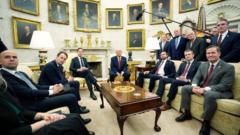A leaked chat conversation among high-ranking officials in the Trump administration exposed discussions around a planned military strike against the Iran-backed Houthi group in Yemen. Vice-President JD Vance expressed concerns about the implications of the attack, particularly how it might benefit Europe more than the US, as tensions regarding defense spending among NATO allies resurged. The leak has led to calls for an investigation, raising questions about national security protocols within the administration.
Major Security Breach Revealed in Trump Administration's Military Chat Group

Major Security Breach Revealed in Trump Administration's Military Chat Group
Leaked messages from a military chat reveal internal debates and concerns regarding US airstrikes in Yemen, highlighting tensions between Trump, his vice-president, and the administration's stance on European defense.
Washington DC is grappling with a significant security breach following the revelation of a leaked military chat group involving senior Trump administration officials. The breach was brought to light by Atlantic magazine's Jeffrey Goldberg, who was added to a Signal messaging group that featured key figures such as Vice-President JD Vance, Defence Secretary Pete Hegseth, and National Security Adviser Mike Waltz. The primary discussion centered on airstrikes against the Iran-backed Houthi forces in Yemen.
Goldberg disclosed that he had access to classified military plans concerning the planned strikes, detailing targets, weaponry, and timing, just two hours before the assaults commenced. The leaked conversation highlights several critical revelations about the decision-making processes within the administration.
Vice-President Vance raised significant concerns regarding the airstrike, noting that it seemed primarily beneficial to European interests given the region's impact on Suez Canal trade. He suggested that President Trump might not fully comprehend how these actions contradict his earlier messages about European defense responsibilities. Vance also warned of potential increases in oil prices due to the military intervention, expressing a desire to delay the strikes by a month to reassess.
As part of the ensuing back-and-forth, Vance voiced his discontent with the notion of the US constantly "bailing out" European nations. Hegseth echoed his frustrations over what he labeled as European "free-loading," stating, "It's PATHETIC." Another unnamed group member inquired about the expected quid pro quo from Europe following US military efforts intended to ensure navigational security.
Following the successful strikes, group members engaged in celebratory emoji exchanges, reflecting a sense of triumph while also sharing their sentiments through prayer messages. Vance was noted to encourage a prayer for success amid reports of the strikes.
The conversation also revealed a desire among officials to manage public perception, with suggestions that the administration pivot blame onto President Biden for perceived failures regarding Iran. Defence Secretary Hegseth acknowledged Vance's concerns about the messaging surrounding the strikes, stating that the complexities of geopolitics may cloud the narrative.
Goldberg's initial invitation to the chat came unexpectedly on March 11, where he later discovered the communication was legitimate. The incident has raised alarms among Democrats, prompting calls for a detailed investigation into the national security adviser's actions.
In response to inquiries regarding the leak, Donald Trump claimed ignorance of the situation, although he reaffirmed support for Waltz. Hegseth, in defense of the group's communications, stated that "nobody was texting war plans," seeking to calm fears over the revealed security vulnerabilities.




















